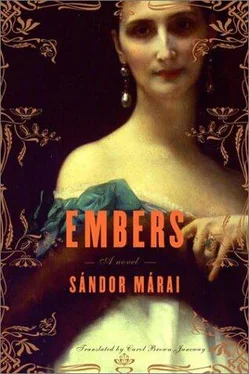“These are the facts. Whoever survives someone is a traitor. We had the feeling that we had to survive, and there’s no prettifying that, for she died because of it. She died because you went away and because I stayed but never once went to her, and because we-the two men to whom she belonged-were more despicable and proud and cowardly and arrogant and silent than a woman can bear; we ran away from her and betrayed her by our survival. That is the truth, and that is what you have to know in London, in the last hours of your lonely life. And here in this house I have to know it too: I know it already. Surviving someone whom one loved enough to consider killing for, who was life and death to one, may not be defined as a capital offense, but it is, nonetheless, a criminal act.
It is not recognized as such in the law, but we recognize it,” he says dryly, “and we know that all our offended, cowardly, haughty masculine intelligence has won us nothing at all, because she is dead and we are alive, and the three of us always belonged together, in life or in death. It is a very hard thing to understand, and once one does, one is overcome by the strangest sense of unease. What did you hope to achieve by surviving her, what victory did you win? … Did you spare yourself some horrible awkwardness, some painful situation? What awkwardness or painful situation could matter, when what is at issue is the very truth of your existence, because somewhere on earth there is a woman who matters to you, and this woman is the wife of the man who also matters to you … Does public opinion carry any weight in something like this?
No,” he says simply.
“Finally, the world is irrelevant. All that counts is what remains in our hearts.” “In our hearts?” asks the guest.
“The second question,” says the General, his hand still holding the door. “Namely, what did we win with all our intelligence and our pride and our presumption? Has the true meaning of our lives not been the agony of longing for a woman who is dead? It’s a hard question, I know.
I cannot answer it. I have done everything, seen everything, and yet this I cannot answer. I have seen peace, I have seen war, I have seen the glitter of empire and utter human misery, I have seen your cowardice and my own arrogance, I have seen combat and surrender. Yet I think that, at bottom, perhaps the significance of everything we did was in the ties that bound us to one particular person-ties, passion, call it what you will. Is that the question? Yes. I want you to tell me.” His voice drops as if to foil some hidden listener behind him.
“What do you think? Do you also believe that what gives our lives their meaning is the passion that suddenly invades us heart, soul, and body, and burns in us forever, no matter what else happens in our lives? And that if we have experienced this much, then perhaps we haven’t lived in vain? Is passion so deep and terrible and magnificent and inhuman? Is it indeed about desiring any one person, or is it about desiring desire itself? That is the question. Or perhaps, is it indeed about desiring a particular person, a single, mysterious other, once and for always, no matter whether that person is good or bad, and the intensity of our feelings bears no relation to that individual’s qualities or behavior? I would like an answer, if you can,” he says, his voice louder and more imperious.
“Why do you ask me?” says the guest quietly, “when you know that the answer is yes.” Their eyes measure each other, steadily, unblinking. The General takes a deep breath and pushes down the handle of the door. The great stairwell is filled with surging shadows and the flicker of lights. They walk down in silence. Servants hurry to meet them with candles and the guest’s coat and hat. Outside the big double doors, wheels grind and crunch on the white gravel. The men take leave of each other with a handshake, a deep bow, wordlessly.
The General walks toward his bedroom. At the far end of the corridor, Nini is waiting.
“Are you feeling calmer now?” she asks.
“Yes,” says the General.
They walk side by side, the nurse with quick little steps, as if she had just got up and was hurrying to her first morning tasks, the General slowly, leaning on his stick. They move through the picture gallery.
When they come to the bare space on the wall where Krisztina’s portrait once hung, the General stops.
“Now you may hang it up again.” “Yes,” says the nurse.
“It’s of no importance anymore.”
“I know.”
“Good night, Nini.”
“Good night.”
The nurse stands up on tiptoe, lifts her little hand with the yellowed skin lying in creases over the bones, and traces the sign of the cross on the old man’s forehead. They give each other a kiss. It’s an awkward, brief, odd kiss, and if anyone were there to see it, it would provoke a smile. But like every kiss, this one is an answer, a clumsy but tender answer to a question that eludes the power of language.
Sandor Marai was born in Kassa, in the Austro-Hungarian Empire, in 1900, and died in San Diego in 1989. He rose to fame as one of the leading literary novelists in Hungary in the 1930s. Profoundly antifascist, he survived World War II, but persecution by the Communists drove him from the country in 1948, first to Italy, then to the United States. He is the author of a body of work now being rediscovered and which Knopf is translating into English.
Carol Brown Janeway’s translations include Binjarnin Wilkomirski’s Fragments, Marie de Hennezel’s Intimate Death, Bernhard Schlink’s The Reader, Jan Philipp Reemtsmas In the Cella; Hans-Ulrich Treichel’s Lost, Zvi Kolitz’s Yost Rakover 1alks to God; and Benjamin Lebert’s Crazy.












